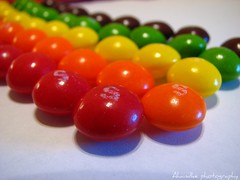 Sunday night, Agency.com relaunched the Skittles* website as a redirect to social network sites. The main page showed a Twitter search for “skittles”. Other links went to flickr, Facebook, and Wikipedia.
Sunday night, Agency.com relaunched the Skittles* website as a redirect to social network sites. The main page showed a Twitter search for “skittles”. Other links went to flickr, Facebook, and Wikipedia.
Hilarity ensued, with “#skittles” shooting to the #1 Twitter term for the day. With over 4000 blog posts and positive articles in the Wall Street Journal, LA Times, the Financial Times and Advertising Age, it’s a viral marketing success story for the ages! Emily Steel’s Skittles Cozies Up to Social Media, David Amaro’s Skittles Goes Modernista! With A Distributed Experience on Logic and Emotion and Tiphereth Gloria’s Why it takes balls to Skittle on Digital Tip are some thought-provoking discussions.
What’s particularly fascinating to me, though, is something Katrin Verclas of MobileActive.org pointed out on the Progressive Exchange mailing list: the significant gender differences in people’s reaction.
Sure enough, the pattern is there in blogosphere as well. I classified the opinions in Skittles articles on the Google News page and a handful of the top hits on Google Blogs as positive, neutral, and negative. The results:
- women: 6 positive, 4 neutral, 0 negative
- men: 12 positive, 3 neutral, 8 negative
And when I say “negative”, whoa baby. David says “By just about any rational indication, Skittles went too far.“  Noah characterizes it as “generally A Bad Idea” and “a gaffe”. Harry sees it as “social-media marketing nihilism.” Riche thinks it’s “the worst strategic decision I have seen online in a long time.” Yow.
There’s no easy way to know how much this reflects an actual difference in opinions. It could be that women avoid harsh criticisms in favor of neutrally-worded posts like Allyson Kapin‘s and Shannon Nelson‘s raising questions about the effectiveness of Skittles’ strategy. One way or another, though, it’s really striking.
Twitter is an opportunity to engage with communities currently marginalized by the “progressive blogosphere”.
— Tracy Viselli and Jon Pincus, Strategies for progressives on Twitter in The Exception
There’s an important lesson here for anybody trying to understand social media, and Twitter in particular. Make sure you’re getting a range of opinions — as well as gender-based differences, there are also age-based differences. In particular, if you’re getting your political news from the male-dominated “progressive” or “conservative” blogospheres (or the mainstream media and pundits who look to the big bloggers as being on the cutting edge), be aware of the possibility that you’re getting a distorted view of social network sites and their value.**
Today Skittles’ home page instead redirects to their Facebook page. Any bets on how people will react?
jon
PS: in the credit where credit is due department, Modernista! took a similar approach with their own web site almost a year ago. Allison Mooney’s Modernista!’s new siteless site on pfsk has more.
Skittles photo from ambibambie39507’s flickr page,
Twitter graphic from joomlatools on flickr,
both licensed under Creative Commons
* a horrible trans-fat-based chemically-tasting candy, if you ask me, although some people loooooove them.
** see for example my comments in Petitions are soooooo 20th century.
jon | 04-Mar-09 at 3:38 pm | Permalink
Incidentally, when Twitter was having problems on Monday, many people wondered whether Skittlemania was the reason. Apparently not, at least according to Biz Stone of Twitter as quoted by Erica Sadun on Ars Technica. And no, it wasn’t Barbara Walters talking about Twitter on The View either. It was just buggy software.
jon | 04-Mar-09 at 6:15 pm | Permalink
Barbara Ortutay’s AP story Facebook: Taking a cue from Twitter in sharing? devotes two paragraphs to Skittles, including …
Skittle skeptic Stan on Mashable similarly sees the move to Facebook as a retreat. By contrast Charlene Li points out in a comment, this move is consistent with Skittles’ executives original remarks about their strategy.
It seems to me that Agency.com started Skittles on Twitter as the most likely place to generate a lot of buzz with relatively few users. “1% of Twitter traffic” was about 1000 messages an hour; that’d be a drop in the bucket on Facebook, and highly unlikely to get remotely as much attention. True, it wasn’t a sustainable strategy. So what? They got what they wanted, and are now shifting the attention (and whatever ongoing traffic they get) to the longer-term-valuable Facebook page.
Business Items :: Mailing It In | 05-Mar-09 at 7:03 am | Permalink
[…] – Skittles recently implemented a new website design that’s garnered notice and analysis from the circle of nerds who do such things professionally. Basically, Skittles now uses its own […]
jon | 09-Mar-09 at 7:31 pm | Permalink
Idealist.org appears to be the first non-profit to try to build on the Skittles experience, putting a page on their home page … props to them! It’ll be interesting to see how much attention they get. Mail’s already gone out to a large mailing list, and they got at least one first-time visitor (me). We shall see …
jon | 21-Mar-09 at 7:35 pm | Permalink
UnHub launched three days after being inspired by Skittles’ new website. It lets anybody “modernista themselves” by creating a single page with their profiles from various social networks. Great idea!
Lessons from Skittles for poets and activists - The Seminal :: Independent Media and Politics | 22-Mar-09 at 1:07 pm | Permalink
[…] as positive presss in the Wall Street Journal, LA Times, the Financial Times and Advertising Age. Gender differences in response to Skittlemania has oodles more […]